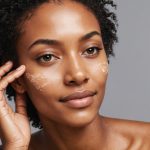Understanding Oily Skin
Oily skin is a common skin type characterised by an overproduction of sebum, the skin’s natural oil. This condition often results in a shiny appearance and can lead to clogged pores and acne. Sebum production is crucial for maintaining skin health, providing moisture and protection against external threats. However, when this production becomes excessive, it can lead to the challenges associated with oily skin.
The reasons behind heightened sebum production are varied. Hormonal changes, especially during adolescence or pregnancy, can increase oil production. Genetic predisposition also plays a role, making some individuals more prone to having oily skin. Additionally, diet and stress levels can influence sebum production, exacerbating the condition.
Additional reading : What defines a natural perfume? the essential insights
Environmental factors can significantly impact oily skin. Humidity and heat often enhance sebum activity, making the skin appear more oily. Pollution and exposure to harsh weather conditions can further irritate the skin, prompting it to produce even more oil as a protective mechanism. Understanding these influences helps tailor skincare routines, ensuring they cater specifically to the needs of those with oily skin. By addressing the intrinsic and extrinsic factors, individuals can better manage and care for their skin type.
Daily Skincare Routine for Oily Skin
Establishing an effective skincare routine is crucial for maintaining healthy skin, especially for those with oily skin. Incorporating the right oily skin products into your regimen can manage excess oil without stripping the skin of its natural barrier. A well-planned daily regimen can also help prevent breakouts.
Also to discover : Elevate your at-home pedicure game: a complete guide to achieving spa-quality results
Morning Skincare Steps
Begin your morning routine with a suitable cleanser. Opt for cleansers designed for oily skin, such as gel-based formulas, which cleanse without leaving a greasy residue. These cleansers efficiently remove sebum and impurities. Follow cleansing with a toner. Using toners with salicylic acid or niacinamide helps in controlling oil and minimizing pores, preparing the skin for the next steps.
Moisturizing is crucial, even for oily skin. Select light, non-comedogenic moisturizers that hydrate without clogging pores. Gel-based moisturizers are ideal, as they are absorbed quickly and leave a matte finish.
Evening Skincare Steps
The evening routine should start with double cleansing to ensure all traces of makeup and dirt are eliminated. Oil-based cleansers remove initial grime, followed by water-based cleansers to purify deeply. Nighttime treatments, including serums with retinol or alpha hydroxy acids, can target acne and refine skin texture. Finish with a non-greasy night moisturizer to maintain skin hydration while you sleep.
Expert Tips for Maintaining a Shine-Free Complexion
Achieving shine-free skin requires a blend of careful skincare routines and mindful lifestyle choices. One of the essential components in this pursuit is regular exfoliation. Exfoliation helps remove dead skin cells, preventing pores from clogging and reducing excess oil on the skin’s surface, a common challenge for those with oily skin. An exfoliant with salicylic acid can be particularly effective, as it penetrates the pores, cleaning out oil and debris.
Incorporating effective face masks into your regimen also plays a pivotal role. Clay masks, for instance, are excellent for absorbing oil and reducing shine. Using them once or twice a week can significantly cut down greasiness, leaving your skin looking fresh and matte.
However, skincare products alone aren’t enough. Diet and hydration are integral to managing oily skin. Opt for a balanced diet rich in fruits, vegetables, and omega-3 fatty acids, which can naturally help control oil production. Furthermore, keeping well-hydrated helps maintain skin balance, as dehydration can sometimes prompt the skin to produce more oil in compensation.
These expert skincare tips, when followed diligently, can help control oil and maintain a shine-free complexion.
Product Recommendations for Oily Skin
Oily skin can be challenging to manage, but with the right skincare products, it becomes easier to control. Whether you’re looking for a new cleanser, moisturizer, or treatment, there’s an oily skin solution for you.
Best Cleansers
Choosing the right cleanser is crucial for oily skin. Gel-based cleansers like Neutrogena’s Hydro Boost are popular, as they cleanse without stripping moisture. When it comes to the eternal debate between foaming vs. non-foaming cleansers, foaming ones are generally better at removing excess oil, while non-foaming options are gentler, making them ideal if you have sensitive skin. If you prefer DIY options, a homemade cleanser using honey and lemon can naturally cut down oil levels, though it may not provide the same long-term benefits as commercial cleansers.
Recommended Moisturizers
For oily skin, lightweight moisturizers are best to avoid clogging pores. Opt for gel-based moisturizers over cream-based ones; they provide necessary hydration without heaviness. Ingredients like hyaluronic acid and niacinamide are beneficial, helping to control oil production and improve skin texture.
Common Mistakes to Avoid
Navigating the world of skincare mistakes can be tricky, particularly when dealing with oily complexions. One common error is over-washing the face. While it might seem logical to scrub away excess oil, washing too frequently can strip the skin of its natural oils, prompting it to produce even more. This cycle ultimately leads to increased shine and potential breakouts. Instead, washing twice daily with a gentle cleanser is usually effective.
Misconceptions about moisturization abound. Many people with oily skin believe skipping moisturiser will help manage shine. However, this is a habit to change. Moisturisers are crucial, even for oily skin types. They help maintain the skin’s barrier and prevent dehydration, which can ironically lead to more oil production. Opt for oil-free, non-comedogenic formulations that won’t clog pores.
Lastly, not understanding your skin’s needs can lead to unnecessary oily skin errors. Each person’s skin is unique, requiring tailored care. Observing how your skin responds to products and changes in routine is essential. Knowledge about your specific skin type and its reactions will guide better choices, ensuring healthier, clearer skin over time.
Understanding Underlying Causes of Oily Skin
Oily skin is a common concern often influenced by a hormonal imbalance. Hormones, particularly androgens, play a significant role in sebum production. An increase in androgens can lead to an uptick in oiliness, which not only affects adolescents but adults too.
Another crucial factor contributing to oily skin is genetics. If oily skin runs in your family, chances are you might inherit it. Your genetic makeup determines how active your sebaceous glands are, leading to more sebum production if oily skin is prevalent in your lineage.
Certain medical conditions can exacerbate oily skin. For instance, polycystic ovary syndrome (PCOS) and other hormonal disorders are commonly linked to increased oiliness. These conditions often cause hormonal imbalances, resulting in heightened sebum production.
Understanding the underlying causes can help target treatments more effectively. Whether it’s managing hormonal fluctuations or considering family history, acknowledging these factors provides a clearer path towards addressing oily skin.
Frequently Asked Questions
If you frequently grapple with oily skin concerns, you’ll find the following expert answers helpful in managing your skincare routine.
How often should I exfoliate oily skin?
Exfoliate oily skin 2-3 times a week to unclog pores and reduce excess sebum. Over-exfoliating can strip the skin’s natural oils, potentially increasing oil production. Balance is key here. Opt for gentle exfoliants and adjust the frequency based on your skin’s reaction.
Can diet affect oily skin?
Yes, diet can significantly impact oily skin. Foods high in sugar and dairy may exacerbate oiliness and lead to acne. Consuming a balanced diet rich in fruits, vegetables, and healthy fats can help. Hydration is equally important, so ensure adequate water intake.
Is matte makeup suitable for oily skin?
Matte makeup is generally suitable for oily skin as it helps control shine and maintains a fresh look throughout the day. Choose oil-free, non-comedogenic products to prevent clogging pores. It’s crucial to prep your skin with a primer to enhance makeup durability and manage oil.
These skincare FAQs offer insights into managing oily skin effectively, helping you make informed decisions and develop a suitable routine.













